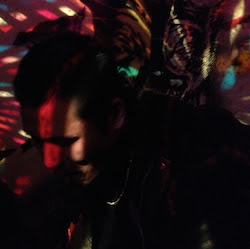Album Review: Dirty Beaches- Drifter/Love is The Devil
I received a text message from a friend of mine the other
day that simply said, “Have you heard of this guy?” Accompanying that was a link to an NPR story.
The NPR story turned out to be about Alex Zhang Hungtai, who
performs under the name Dirty Beaches. Dirty Beaches is a name that I see a lot
in stories on Pitchfork, but I had also lumped it in with bands that have names
like Dirty Projectors, Cloud Nothings, and Beach Fossils. Hungtai has nothing
to do with any of those bands.
I can’t even begin to describe the kind of music that Dirty
Beaches is capable of producing. In a message back to my friend, I mentioned to
her that I found the new Dirty Beaches double LP Drifters/Love is The Devil to be incredibly inaccessible to a
casual listen. But I also thought I should give it another shot and write about
it for the blog.
Drifters/Love is
16 songs deep—8 for each album. There’s a definite distinction between the two—Love is The Devil is primarily ambient,
experimental droning. Drifters, on
the other hand…I don’t even know. It’s noisy, claustrophobic, somewhat
terrifying, and somewhat unsettling. The lo-fi as fuck production values are
reminiscent of pretty much ANY artist that has used a four-track recorder, or
has purposefully made music with shitty production values. The blown-out sound
is akin to that of Love Remains, the
debut album by How to Dress Well.
Drifters is
covered in reverb. Soaked is maybe a better word. Every word mumbled, every
cheap sounding drum machine track, every note—it all ends up so layered, the
songs evoke a feeling, rather than just being a three-minute pop song with
lyrics you can understand.
Hungtai’s singing voice is low. On the tracks he does sing
on, it’s heavily distorted and nearly impossible to understand what he’s
saying. On the opening one-two punch of “Night Walk” and “I Dream in Neon,” his
low growl is very similar to that of truck driver turned musician Daughn
Gibson. Drifters ends with two shouty
tracks, “Aurevoir Mon Visage,” and “Mirage Hall,” before launching into the
instrumental closer, "Landscapes in The Mist,” which is pretty much the
soundtrack to every nightmare you’ve ever had, if they were all written and
directed by David Lynch.
Love is The Devil,
as a whole, is much more restrained than its companion album. However, at
times, the songs on Love feel like
they are just sketches or ideas that were never full realized—such as “Woman,”
which is just like four minutes of some cool keyboard beeps and boops, with
other eerie noises over the top of it. While none of the songs on Love become as unhinged as a few on Drifters, that doesn’t mean they are any
less unsettling. “This is Not My City” captures an underlying sense of dread
pretty well. A little TOO well if you ask me.
In the NPR interview for “All Things Considered,” time is
spent discussing Hungtai moving around a lot as a child, and how his inability
to settle in one place still affects him now, as well as his songwriting. It
also talks about nostalgia—an old photo of his father performing in a doo-wop
band—and how he has made an older sound his own. All of this is super apparent
on his debut full length, 2011’s Badlands.
While there are faint traces of this on the new double LP, his influences are
less obvious.
After a closer listen, Drifters/Love
is The Devil is still not an easily accessible record. I have to chuckle a little
at Hungtai’s profile on NPR—certainly this will expose him to an audience that
otherwise would not be aware of him—at the same time, I have a difficult time
picturing a typical NPR listener identifying with, or even liking, this music.
If you are patient, and want to be challenged by what you listen to, this may
be the album for you. It’s by no means bad, but it’s almost so experimental and
uninviting that it keeps you at an arm’s length.
